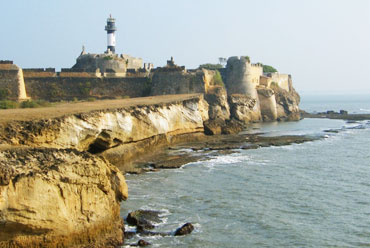Goa had a strange equation with Daman and Diu. Their two representatives in the Goa Assembly would be used to shore up the ruling party's majority

Last week's plane crash at Ahmadabad caused shock and horror. Its suddenness took all by shock. The gruesome pictures made feelings even more searing.
Surely, the stories of all the people on board were gut-wrenching. One person just walking (or limping) off the crashed plane; while a family full of smiles who were migrating Westwards perished; so did two young girls who visited just for their grandmum's birthday. So many stories, including one of a lady who missed the flight by a few minutes; she probably hadn't even finished cursing her luck, when the tragedy struck! Life's like that.
We can all understand the pain. Part of it comes from an it-could-have-been-me feeling. Especially for those of us in the flying classes, who indulge in an activity we assume to be quite safe.
Such events, horrid though each may be, also remind us of other realities: Child mortality is an everyday tragedy of enormous scale. But that rarely makes the headlines; and we don't get outraged by it. A large jumbo jet can carry up to 600 passengers. The number of child deaths (14,000 per day, worldwide) is equivalent to a crash of a jumbo jet with only children on board, every hour of every day of the year. Why doesn't it shock us?
It can be tempting to use tragedy to remind ourselves of the impermanence of life. One minute up and all smiles; the other minute, in the dumps. Indeed, the Ahmadabad crash reminded us of all that.
It's sometimes only too tempting to see how a particular issue touches us, and then respond. One of the first responses to the crash news (from expat Goans, even before the full extend of the crash struck home) said: "The seven 'Portuguese' are probably Goans."
It turned out they were not. Some relief, but that doesn't make the sorrow less.
Flight lists gave the names of the Portuguese nationals on board the ill-fated AI 171 as: Santubhai Bica, Vanita Cana, Girish Lalgi, Devji Lachmane, Hemaxi Shantilal, Chandu Baguane, and Vassaramo R Premgi. The second, fifth and seventh being women.
Speculation on some Goan groups veered close to racism. Aren't we all racist, in one way or another? It was suggested that the 'Portuguese nationals' on board the plane could be actually Gujaratis who had somehow accessed fake passports.
But soon, the Press told another story.
The Wall Street Journal has this article by Shan Li, which is titled 'An island with strong ties to Europe counts its dead after Air India crash'. She told us that the only survivor of Air India Flight 171 "was born on this tropical island dotted with palm trees and fishing boats".
The same was true, the journalist wrote, of 14 passengers who died in the crash. Most were "Portuguese or British nationals of Indian origin". The journalist spoke about this class of people having "straddled two continents" and spending part of their life on "long-haul flights between work and family".
Li, with the resources that journos working for large international publications have access to, apparently speedily visited the homes of some victims in Diu. She talks of life there with some villages seeing "at least one-third" of their population moving abroad. Sounds familiar?
Many have built "big houses in Diu that sit empty for most of the year". Some had planned to retire to Diu, but that was not to be. Being part of the "large Indian diaspora that has spread all across the world" is fine, but it comes at a price. The non-residents still "feel the pull of the island". But there's also the reality of acutely limited job opportunities in Diu.
In the past fortnight too, the long-retired DySP Alex Rasquinha was interviewed by journo and former Department of Information employee John Aguiar. Rasquinha talks briefly of his stints in Diu and Daman, and calls these "punishment postings" for officers then based in Goa, in the former Union Territory. They were distant from Panaji.
This also reminds one about Statehood, which came suddenly in 1987, and after years of being on the back-burner. At that time, Panaji quickly dumped its overland 'colonial cousins', and seems to have forgotten all about it.
After that convenient parting of ways of ways, we hear little about Daman and Diu, There are few to none newspaper reports (leave aside academic writing) on these places, which shared a common history with Goa for centuries.
Even in earlier times, Goa had a strange equation with Daman and Diu. At best, their two representatives in the Goa Assembly would be used to (usually) shore up the ruling party's majority.
Also interesting is a recent book by B.V. Kumar, titled 'DRI & The Dons: The Untold Stories'. The DRI here refers to the Directorate of Revenue Intelligence. Chapter 25 (p. 177-190) deals entirely with 'The Don of Daman -- Sukar Naran Bakhia'.
Kumar writes: "If one has to identify the 'Don' among the dons of Gujarat, without batting of an eyelid the name of Sukar Naran Bakhia of Daman pops up. [Others] pale into insignificance, since they were the landing agents for top smugglers like Dawood Ibrahim and not independent operators."
Some may recall that Bakhia had a bizarre 'escape' from Aguada jail. That so-called escape, and reporting it, was a story in itself, in its times.This twist to the tale is not meant to give a sensational ending to a story of much relevance to Goa.
Sad that history can be forgotten in the bat of an eyelid; and it might take a devastating plane-crash to remind us of that, once more.